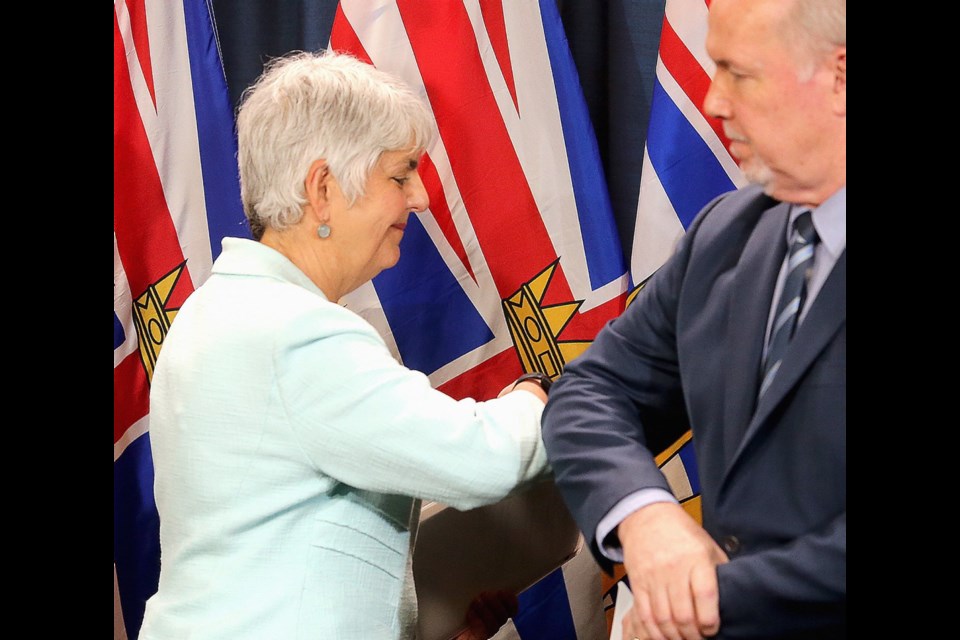• Emergency order allows for faster actions
• More cases confirmed as more test results come back
• Reminder that people coming to Canada must self-isolate for 14 days
• Elderly people encouraged to say home, away from others
• Social distancing is key in avoiding infection, along with washing hands, not touching face
B.C.’s provincial heath officer declared a public-health emergency Tuesday, as the number of COVID-19 cases in the province rose to 186 and the death toll increased to seven. “Tragically, we have three new deaths reported today,” Dr. Bonnie Henry announced at the daily news briefing on the novel coronavirus.
Two of the deaths are associated with the outbreak at Lynn Valley Care Centre, while another was a man in his 80s who died in hospital in the Fraser Health Authority on Monday, she said.
Eighty-three new cases of COVID-19 have been confirmed in the province. There are 12 cases on Vancouver Island.
Vancouver Coastal Health is dealing with 116 cases of the disease, while Fraser Health has 47, Interior Health has seven and there are four cases in Northern Health.
Of the 186 cases, seven people are in hospital, including four being treated in intensive care, said Henry. In the vast majority of cases, people are managing the illness in isolation at home, she said. Five people have recovered and others have very mild symptoms.
Henry said she took the extra step of declaring a public-health emergency Tuesday “because I felt today this was the tool we needed now.”
The declaration allows the provincial health officer to be faster, more streamlined and nimble in taking measures aimed at curbing the outbreak, she said.
Bars and clubs have been ordered to close because they can’t meet the criteria for physical and social distancing. Declaring an emergency also allowed Henry to issue an order for people returning to Canada from anywhere in the world, including the U.S., to self-isolate for 14 days.
“This is voluntary, unless you don’t do what we say. Then we have the ability to enforce an order on it. So it is something that we take very seriously and that we are willing to enforce it if we need to,” said Henry.
“But our experience has been that they understand the risk to themselves, the risk to their families and to their communities. We have not had issues with people who have been refusing to isolate or take the advice they have been given.”
Henry stressed that the 86 new COVID-19 cases announced Tuesday aren’t just people who tested positive in the previous 24 hours. There has been a dramatic increase in people going for testing in the last few days and an expansion in the number of testing sites in the province, she said.
The increase includes a number of people who tested positive at St. Paul’s Hospital and Vancouver General Hospital last week, then needed to get a second test from the B.C. Centre for Disease Control. In the meantime, these who initially tested positive were notified, as were public health officials, and those people were put in isolation.
Henry said she expects to see the number of COVID-19 cases increase in the next few days because of the new testing strategy and as a backlog of cases is managed.
Testing is now focused on clusters and outbreaks in the community that might not be related to travel, as well as health-care workers, long-term-care-facility residents and people in hospital.
Henry continued to emphasize the importance of social distancing. She and B.C. Health Minister Adrian Dix demonstrated how to keep a safe distance from each other, standing back, arms outstretched, fingertip to fingertip in front of the podium.
Although casinos, bars and clubs have been ordered to close, restaurants and cafés can, in some cases, maintain physical distancing for customers, said Henry. Those that can’t will need to close or move to takeout and delivery services.
Businesses and services that are remaining open, particularly grocery stores, pharmacies, public utilities, transportation, public safety and essential goods and services, must incorporate distancing measures for workers and customers, said Henry.
“These are tools that we have to build our firewall, so we are stopping that transmission between people in our communities and in our families,” she said.
Henry said there is no widespread community spread of the virus — yet.
Dix noted B.C. received a significant number of swabs to test for the virus Tuesday. In addition, the B.C. Centre for Disease Control has repurposed swabs used for sexually transmitted infections for COVID-19 testing.
The province will soon receive a significant shipment of N-95 masks, which has been a concern for frontline health workers, Dix said, noting there are adequate supplies of the mask until those arrive.
Henry urged British Columbians to take five basic preventative measures: Wash your hands, cover your mouth when you cough, don’t touch your face, stay home when sick and stay away from others.
She announced the creation of a new B.C. COVID-19 self-assessment tool, available online. The self-assessment tool, which lets people know the warning signs of the disease and indicates whether someone should get tested, has been tried by more than half a million people already, she said. The website is here: https://covid19.thrive.health
She emphasized that seniors and elderly people must be encouraged to stay home and away from others and that people in the community need to support them
“These are the things I need people in B.C. to do now, so that in two weeks, we are not facing another crisis, that we’re facing the ability to weather the storm together,” said Henry. “This is the time to be kind, to be calm and to be safe.”



